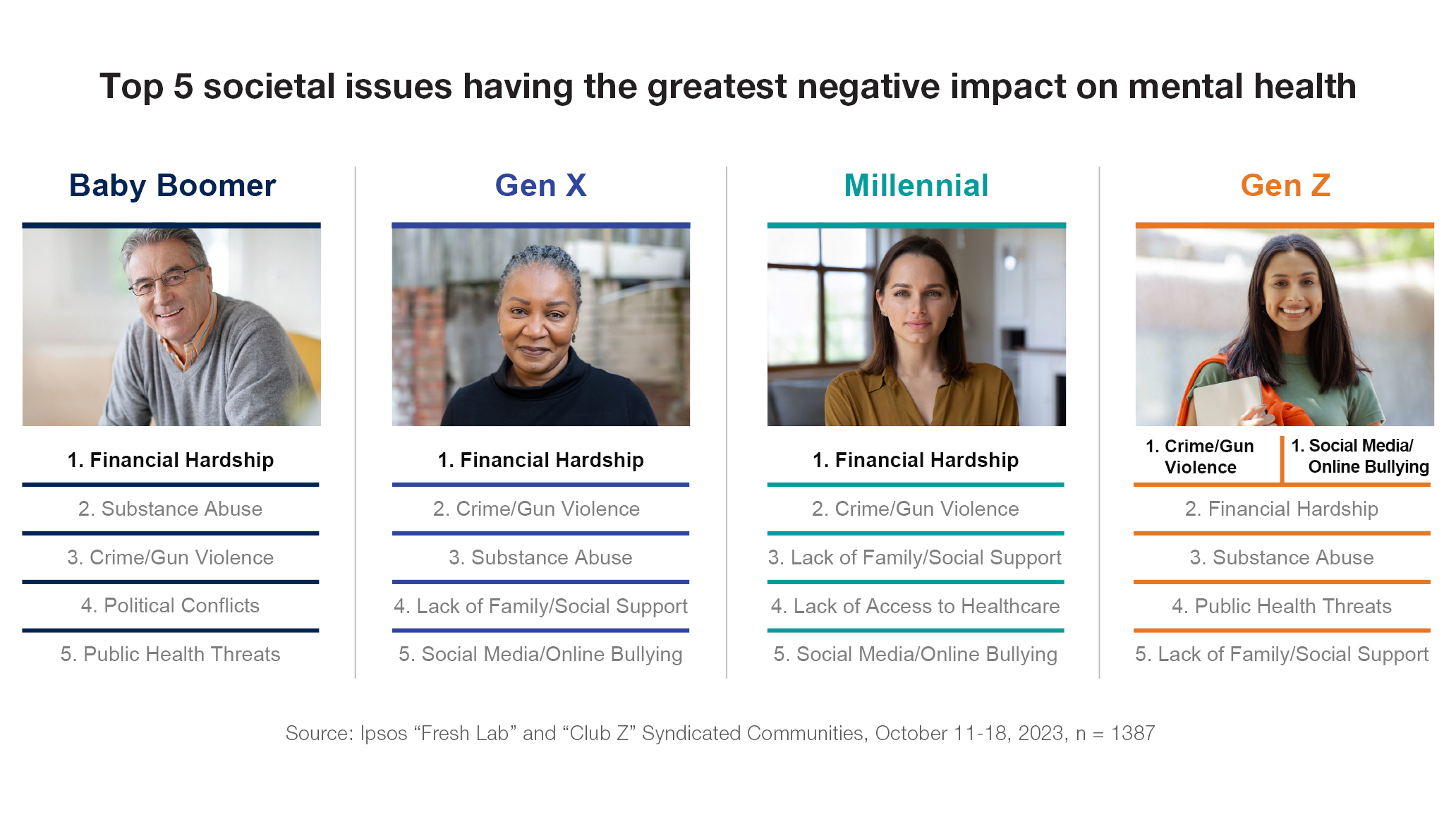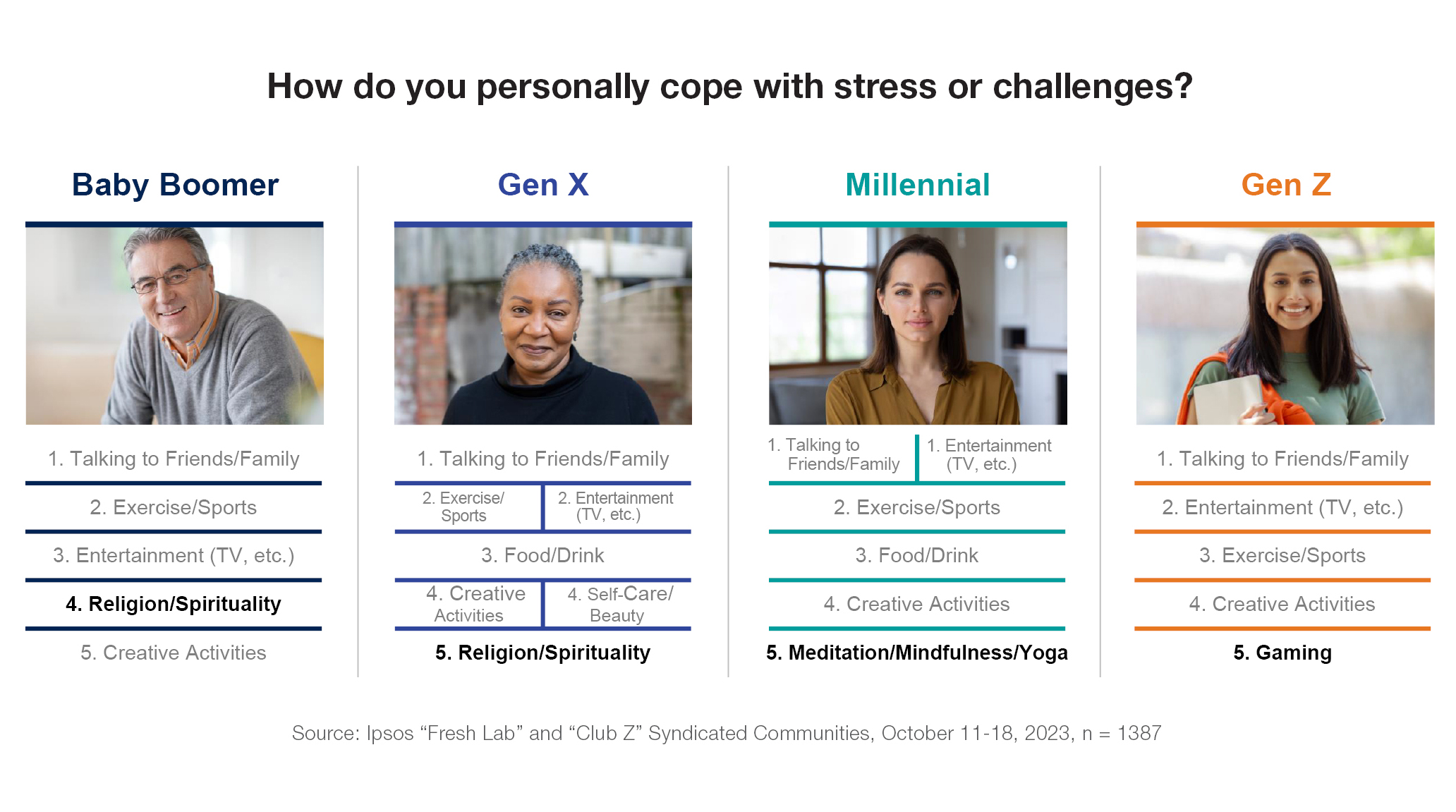From Awareness to Empathy
KEY FINDINGS:
- While financial hardship, information overload and the COVID-19 pandemic have had negative effects on the mental health of most Americans, each generation has their own unique struggles and ways of coping.
- Many turn to relationships, exercise and entertainment, and one in three use dedicated resources like apps, therapy or coaching to improve their mental health. However, only half are satisfied with the professional support they have received and 70% perceive stigma in seeking help.
- Brands and policymakers should understand that people are hungry for more widespread, affordable and accessible mental health resources that can foster stability, support, empathy and self-care.
❝ I do believe that there’s an American attitude about mental health that it’s something that should be handled privately, and mostly by yourself. ❞
—Ipsos Gen Z Community Member
Americans are equally split about how they rate their mental health, with 51% feeling positive and 49% feeling negative or neutral.
❝ Mental health is what keeps you going every day. It’s what gets you out of bed, provides you some energy, encourages you to try your best, keeps you doing the things that need to be done…with poor mental health, everything suffers.❞
—Ipsos Gen Z Community Member
Americans across generations view mental health as an essential part of overall well-being, integrally tied to emotional, physical, social and spiritual health. However, according to the latest Ipsos Community research on mental health, they are almost equally split about how they rate their own, with 51% feeling positive and 49% feeling negative or neutral¹. The Ipsos Global Health Service Monitor reports that over half (53%) of Americans say mental health is now the biggest health problem facing the country².
While a few key events and societal issues have impacted mental health for people across different ages and life stages, our community research also revealed unique generational perspectives, challenges and coping mechanisms.
These collective insights and nuances can help guide companies and organizations to provide the type of support and resources consumers are seeking as we look ahead to 2024.
¹ Source: Ipsos “Fresh Lab” and “Club Z” Syndicated Communities, October 11-18, 2023, n = 1387
² Source: Ipsos Global Health Service Monitor 2023, July 21 – August 4, 2023, n = 1000
Financial hardship is the No. 1 societal issue impacting mental health for most, but people are feeling pressure from all sides.
When asked to rate their overall mental health today, Baby Boomers felt the most positive about life (58%) while Millennials report the highest negative state (21%). Financial hardship is the leading issue among all generations except for Gen Z, who were unique in naming “crime/gun violence” and “social media/online bullying” as their number one issue. While Baby Boomers were the only generation who did not include social media/online bullying among their top concerns, they were also the only cohort to specify political conflicts as a top issue. Millennials were the only group to name “lack of access to healthcare” as a leading challenge.

Across age groups, COVID-19 is viewed as the specific event with the greatest impact on mental health. Information overload and constant exposure to negative news have also contributed to increased stress and anxiety for many.
Which historical or current events have had the greatest impact on the mental health of your generation?
❝ I would say the pandemic has slowed us down because people have lost loved ones and it also had divided us more than ever.❞
— Ipsos Community Member (Millennial)
❝ Currently, everything on the news makes me feel anxious... I now turn the news off, but it seems to bombard me wherever I go!❞
— Ipsos Community Member (Baby Boomer)
People feel they need more help to improve mental health, but believe there is still a stigma attached to seeking care
When asked about the most important thing that would need to happen to improve mental health in the U.S., a clear theme of “people need more help” emerged. This took the shape of more widespread, affordable and accessible mental health support, as well as reduced stigma around seeking care.

Despite wanting help, 71% of people believe there is still a stigma attached to seeking it. While Gen Z respondents call out a fear of being isolated, Baby Boomers often point to underestimating mental health needs as reasons why people may be reluctant to actively seek support.

❝ I think a lot of people just don’t want others to think something is wrong with them or feel singled out..❞
— Ipsos Community Member (Gen Z)
❝ Most people don’t understand the seriousness of mental health issues if they haven’t experienced it personally.❞
— Ipsos Community Member (Baby Boomer)
Many turn to relationships, exercise and entertainment, and one in three use dedicated resources to improve their mental health. However, only half are satisfied with the professional support they have received.
Most people feel comfortable discussing their mental health with friends and family and say this is the #1 way they personally cope with stress or challenges. Exercise and entertainment are also leading ways people cope. Baby Boomers and Gen X are more likely to turn to religion or spirituality to cope with stress or challenges, Millennials to meditation or yoga, and Gen Z to gaming.

One in three people also turn to designated mental health resources for support, including apps for mental health, physical fitness or nutrition coaching, psychotherapy or counseling, and emergency services. One in four use over-the-counter medication, prescription medication, and employer assistance programs. However, of those who have sought professional services for mental health, less than half are satisfied with the treatment and support they received.

Generations are divided about whether technology has had a positive or negative impact on their mental health overall. While two in three Baby Boomers believe technology has not impacted their well-being either positively or negatively, one in three Millennials feel their personal mental health has been negatively impacted by technology.

❝ Such high levels of productivity are expected because of advanced technology and our generation can never fully get away from technology. I think tech creates anxiety, sensory overload, and constant work or burnout.❞
— Ipsos Community Member (Millennial)
Stability, support and self-care are paramount to achieving the best mental health for most, and empathy is key.
Overall, people want stability, to feel supported by others and to practice self-care to achieve the best mental health. Two in three (66%) specifically pointed to exercise as having a positive effect on mental health, and others reiterated the importance of reaching out to others, getting their finances in order and spending time away from the screen to focus on hobbies or outdoor activities such as gardening, hiking and the like. Finally, a significant theme of empathy also came through in response to how to improve mental health overall – in other words, an emphasis on not only what you can do for yourself, but how people can help one another.
❝ [Mental health is] having a balanced view and attitude toward life, while striving to be the best version of yourself without stressing yourself out about it, and helping other people along the way with humility, love and empathy.❞
— Ipsos Community Member (Gen X)
What brands and policymakers can do
- Increase awareness: Make sure that people are aware of what resources are out there; communicate where it exists or where to go to find help
- Make it affordable: People need to be able to afford the products or services they seek; offer inclusive pricing structures so as many people as possible can afford it
- Facilitate access: Establish convenient access across age groups and communities; offer multiple locations, flexible scheduling, simple instructions
- Help destigmatize: Work with ambassadors and influencers to help destigmatize seeking help for mental health
- Revisit our on demand webinar for more insights!


